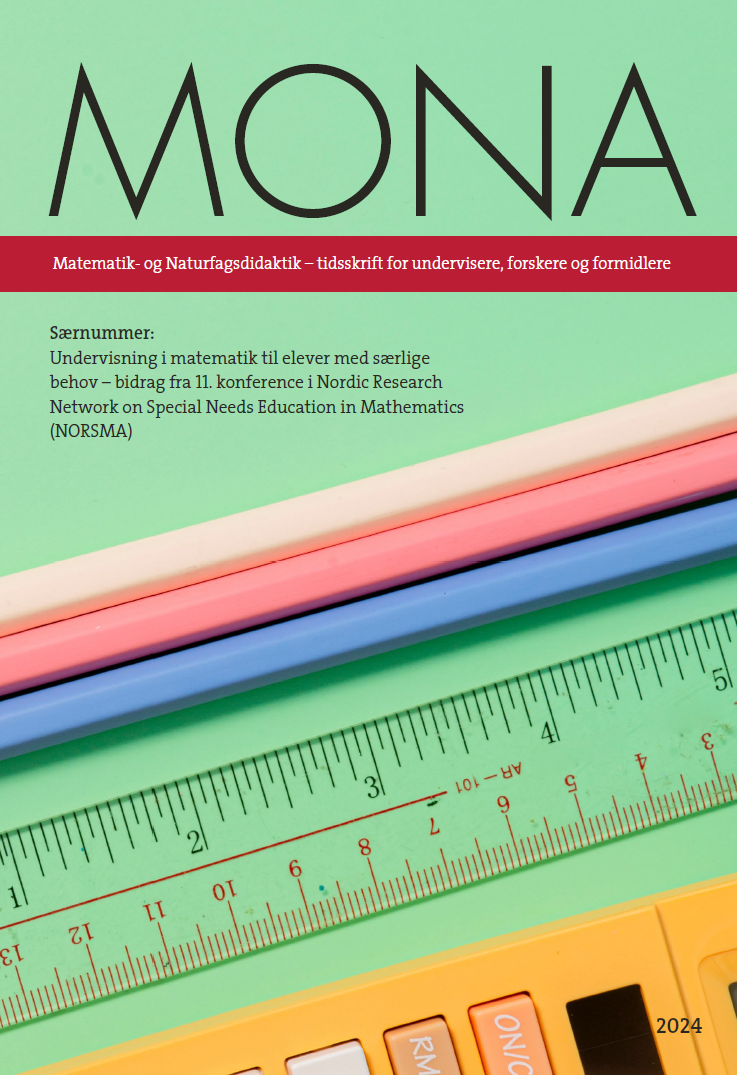Resumé
Artikkelen rapporterer delfunn fra en multikasusstudie som undersøker matematiske læringsmuligheter i heterogene smågrupper for elever (13‑14 år) som presterer lavt i matematikk. Studien er forankret i teorien om objektivisering og i posisjoneringsteori og diskuterer hvordan medelevenes multimodale handlinger kan regulere elever som presterer lavt i matematikk sine muligheter til å
delta i gruppas aktualisering av matematisk kunnskap. For å undersøke dette har flere heterogene smågrupper blitt filmet mens de har jobbet med LIST-oppgaver. Resultatet viser eksempler på regulerende handlinger som kan regulere elever som presterer lavt sin deltakelse. Videre illustrerer studien at LIST-oppgaver kan skape læringsmuligheter for alle i inkluderende klasserom.
Referencer
Andersson, A., & Wagner, D. (2019). Respond or dismiss: Interactions that may support loving, bullying and solitude in mathematics. Journal of the Canadian Association for Curriculum Studies, 17, 47‑74.
Bakhtin, M. (1986). Speech genres and other late essays. University of Texas Press.
Barclay, N. (2021). Valid and valuable: Lower attaining pupils’ contributions to mixed attainment mathematics in primary schools. Research in Mathematics Education, 23(2), 208‑225.
Ben-Yehuda, M., Lavy, I., Linchevski, L. & Sfard, A. (2005). Doing wrong with words: What bars students’ access to arithmetical discourses. Journal for Research in Mathematics Education, 36, 176‑247.
Boaler, J. & Sengupta-Irving, T. (2016). The many colors of algebra: The impact of equity focused teaching upon student learning and engagement. The Journal of Mathematical Behavior, 41, 179‑190.
Davies, B. (2022). Positioning and the thick tangles of spacetimemattering. Qualitative Inquiry, 29(3‑4), 466‑474.
Davies, B. & Harré, R. (1990). Positioning: The discursive production of selves. Journal for the Theory of Social Behaviour, 20(1), 43‑63.
Dekker, R. & Elshout-Mohr, M. (1998). A process model for interaction and mathematical level raising. Educational Studies in Mathematics, 35(3), 303‑314.
Empson, S. B. (2003). Low-performing students and teaching fractions for understanding: An interactional analysis. Journal for Research in Mathematics Education, 34(4), 305‑343.
Esmonde, I. & Langer-Osuna, J. M. (2013). Power in numbers: Student participation in mathematical discussions in heterogeneous spaces. Journal for Research in Mathematics Education, 44(1), 288‑315.
Herbel-Eisenmann, B. A., Wagner, D., Johnson, K. R., Suh, H., & Figueras, H. (2015). Positioning in mathematics education: revelations on an imported theory. Educational Studies in Mathematics, 89(2), 185‑204.
Heyd-Metzuyanim, E. (2013). The co-construction of learning difficulties in mathematics—teacher–student interactions and their role in the development of a disabled mathematical identity. Educational Studies in Mathematics, 83(3), 341‑368.
Radford, L. (2014). Towards an embodied, cultural, and material conception of mathematics cognition. ZDM, 46(3), 349‑361.
Ryan, U. (2019). Mathematical preciseness and epistemological sanctions. For the Learning of Mathematics, 39(2), 25‑29.
Schmidt, M. C., & Thygesen, S. (2024). Think carefully, let’s bond, and other tutoring strategies: Socio-academic participation patterns in peer tutoring. European Journal of Inclusive Education, 3(1), 25‑42.
Simensen, A. M. (2022). Matematiske læringsmuligheter for alle: En styrkebasert flerkasusstudie om elever som presterer lavt i matematikk sin deltakelse i heterogene smågrupper (Bd. 365). [PhD thesis] Universitetet i Agder. https://uia.brage.unit.no/uia-xmlui/bitstream/handle/11250/2987450/Simensen%20avhandling%202022_03_07.pdf?sequence=2&isAllowed=y
Simensen, A. M. & Olsen, M. H. (2019). Tasks that enhance creative reasoning: supporting gifted pupils in inclusive education systems. I M. Nolte (Red.), Including the Highly Gifted and Creative Students – Current Ideas and Future Directions. The 11th international conference on mathematical creativity and giftedness (MCG 11) (s. 202‑208). WTM – Verlag für wissenschaftliche Texte und Medien.
Straehler-Pohl, H., Fernández, S., Gellert, U. & Figueiras, L. (2014). School mathematics registers in a context of low academic expectations. Educational Studies in Mathematics, 85(2), 175‑199.
Tait-McCutcheon, S. L. & Loveridge, J. (2016). Examining equity of opportunities for learning mathematics through positioning theory. Mathematics Education Research Journal, 28(2), 327‑348.
Wagner, D., & Herbel-Eisenmann, B. (2009). Re-mythologizing mathematics through attention to classroom positioning. Educational Studies in Mathematics, 72(1), 1‑15.
Watson, A. (2002). Instances of mathematical thinking among low attaining students in an ordinary secondary classroom. The Journal of Mathematical Behavior, 20(4), 461‑475.

